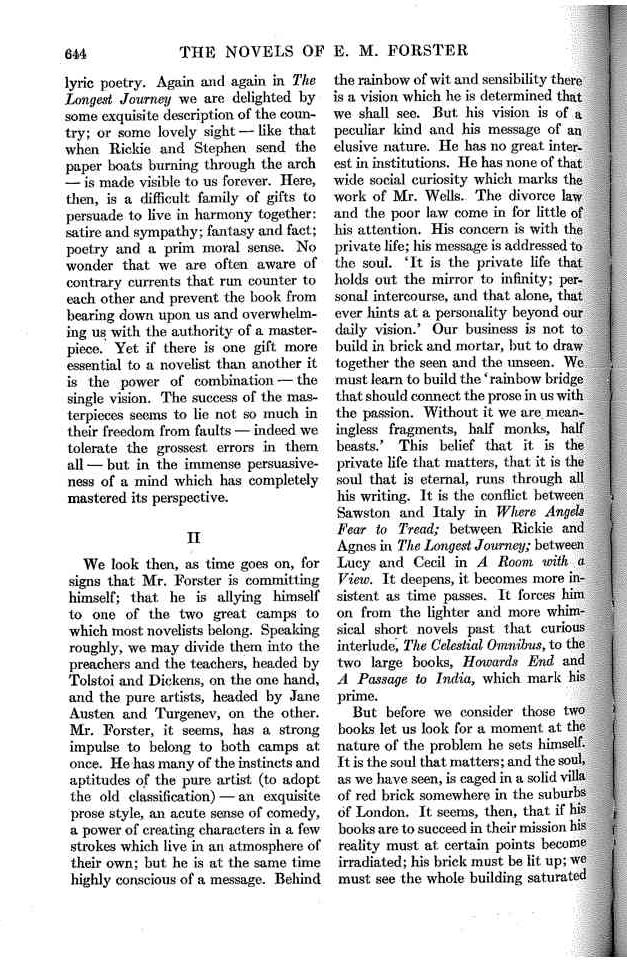
lyric poetry. Again and again in The
Longest Journey we are delighted by
some exquisite description of the coun-
try; or some lovely sight—like that
when Rickie and Stephen send the
paper boats burning through the arch
—is made visible to us forever. Here,
then, is a difficult family of gifts to
persuade to live in harmony together:
satire and sympathy; fantasy and fact;
poetry and a prim moral sense. No
wonder that we are often aware of
contrary currents that run counter to
each other and prevent the book from
bearing down upon us and overwhelm-
ing us with the authority of a master-
piece. Yet if there is one gift more
essential to a novelist than another it
is the power of combination—the
single vision. The success of the mas-
terpieces seems to lie not so much in
their freedom from faults—indeed we
tolerate the grossest errors in them
all—but in the immense persuasive-
ness of a mind which has completely
mastered its perspective.
II
We look then, as time goes on, for
signs that Mr. Forster is committing
himself; that he is allying himself
to one of the two great camps to
which most novelists belong. Speaking
roughly, we may divide them into the
preachers and the teachers, headed by
Tolstoy and Dickens, on the one hand,
and the pure artists, headed by Jane
Austen and Turgenev, on the other.
Mr. Forster, it seems, has a strong
impulse to belong to both camps at
once. He has many of the instincts and
aptitudes of the pure artist (to adopt
the old classification)—an exquisite
prose style, an acute sense of comedy,
a power of creating characters in a few
strokes which live in an atmosphere of
their own; but he is at the same time
highly conscious of a message. Behind
[new column]
the rainbow of wit and sensibility there
is a vision which he is determined that
we shall see. But his vision is of a
peculiar kind and his message of an
elusive nature. He has no great inter-
est in institutions. He has none of that
wide social curiosity which marks the
work of Mr. Wells. The divorce law
and the poor law come in for little of
his attention. His concern is with the
private life; his message is addressed to
the soul. 'It is the private life that
holds out the mirror to infinity; per-
sonal intercourse, and that alone, that
ever hints at a personality beyond our
daily vision.' Our business is not to
build in brick and mortar, but to draw
together the seen and the unseen. We
must learn to build the 'rainbow bridge
that should connect the prose in us with
the passion. Without it we are mean-
ingless fragments, half monks, half
beasts.' This belief that it is the
private life that matters, that it is the
soul that is eternal, runs through all
his writing. It is the conflict between
Sawston and Italy in Where Angels
Fear to Tread; between Rickie and
Agnes in The Longest Journey; between
Lucy and Cecil in A Room with a
View. It deepens, it becomes more in-
sistent as time passes. It forces him
on from the lighter and more whim-
sical short novels past that curious
interlude, The Celestial Omnibus, to the
two large books, Howards End and
A Passage to India, which mark his
prime.
But before we consider those two
books let us look for a moment at the
nature of the problem he sets himself.
It is the soul that matters; and the soul,
as we have seen, is caged in a solid villa
of red brick somewhere in the suburbs
of London. It seems, then, that if his
books are to succeed in their mission his
reality must at certain points become
irradiated; his brick must be lit up; we
must see the whole building saturated






